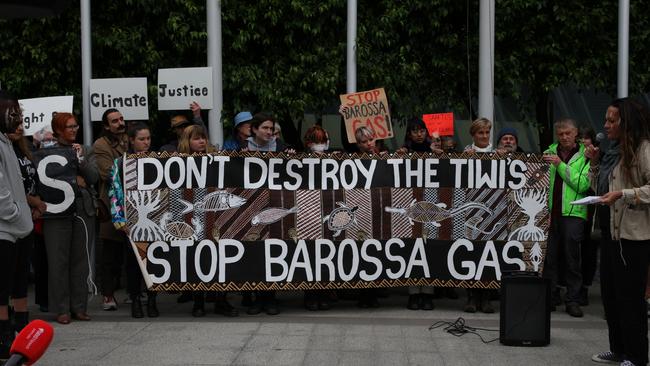Santos’ victories has improved the regulatory landscape for gas developers, analysts say
Santos will proceed rapidly with its $5.3bn LNG development, as a Federal Court ruling improves the regulatory landscape facing the gas industry.
Business
Don't miss out on the headlines from Business. Followed categories will be added to My News.
The decision to allow Santos to push forward with developing its $5.3bn LNG facility has improved Australia’s regulatory landscape and eased regional jitters it may have been forced to seek out alternative supplies, analysts have said.
A Federal Court on Monday rejected a claim the gas giant’s proposed 262km pipeline would cause irreparable damage to First Nations people and their sites, the ruling coming just weeks after the National Offshore Petroleum Safety and Environmental Management Authority gave the gas giant the green light to resume drilling.
The ruling was hailed by Australia’s gas and financial industry, with RBC Capital Markets analyst Gordon Ramsay saying it lowered the risk of authorities and the courts blocking new projects.
“We are now seeing a positive shift in the broader regulatory landscape and NOPSEMA approval process for Australian offshore energy projects,” Mr Ramsay said.
“The favourable Barossa pipeline and drilling decisions highlight, in our view, the intricate balance that Santos must maintain between advancing a major project development and navigating the ongoing regulatory and environmental challenges.”

Australia’s resource sector has cheered the ruling, described by senior industry figures as “astonishing” after Federal Court Judge Natalie Charlesworth offered a stinging rebuke of the case brought by the Environmental Defenders Office (EDO) on behalf of Tiwi Islands traditional owner Simon Munkara.
Justice Charlesworth ruled the claims were predicated on evidence which she described as lacking in integrity so much so that no weight could be placed on it.
Justice Charlesworth said she could not find sufficient evidence the potential for damage to Sea Country was broadly shared among First Nations people in the area.
The case centred on the Ampiji Dreaming, the story of the rainbow serpent.
However, in a stinging rebuke, Justice Natalie Charlesworth said the claim was predicated on contradictory and embellished evidence, as she accused the EDO of coaching witnesses to strengthen their claims that if successful would have blocked Santos from completing work on the project’s 262KM pipeline.
While the EDO and others may be hesitant to launch new claims against resource projects, Santos is unlikely to make itself a further target by revealing too many operational details about the project that is expected to produce its first gas in early 2025.
A fresh move to block the project is widely seen as unlikely, with industry sources also highlighting a potential precedent included in Justice Charlesworth ruling, specifically that the prospect and impact of any cultural harm would need to be “significant”.
“It sets the standard. The legal profession will now be hesitant,” said one lawyer, who spoke on condition of anonymity.
A reduced appetite for litigation would be a major relief for Woodside, which is pushing ahead with its own new $16.5bn Scarborough LNG development – which is vehemently opposed by environmentalists.
While the prospect of similar actions might be mitigated, Australia’s gas industry remains unsettled over the legal action, which it said has denied much needed investment into the NT, demonised Santos and risked the country’s regional reputation.
“Indigenous people were being used as pawns. Activists went as far as to alter the song lines of Indigenous people to fit their narrative. If that was anyone else, if that was a fossil fuel company – the outage from the left would be deafening,” one senior industry executive said.
Writing in The Australian, MST Marquee head of energy research Saul Kavonic said Australia’s gas industry took its indigenous relationships far more seriously than almost any other industry.
However, he said, “unworkable consultation requirements now present the single largest existential threat to Australia’s entire LNG industry, and one of Australia’s largest export earners.
“If not fixed, no less than tens of thousands of high paid jobs, tens of billions in tax revenue, and the health of the economy of Western Australia is at stake.”
Meanwhile, Macquarie analyst Mark Wiseman said the Santos ruling will also be greeted warmly by regional allies, many of which are reliant on Australia to meet its energy needs.
“The court decision is significant from a sovereign risk perspective. North Asian buyers of Australian LNG have been concerned about this case in terms of resource rights and security of supply of basic energy commodities,” Mr Wiseman said.
“This Federal Court decision demonstrates that Australia’s legal system does function to protect resource rights and development permits, and sends a signal to climate activists who ideologically seek to prevent all fossil fuel development.”
The Barossa project, in which Korea’s SK E&S and Japan’s JERA have stakes, has been earmarked to guarantee regional gas supplies, and Japan particularly has grown increasingly concerned about Canberra’s attitude towards gas.
The head of Japan’s biggest oil and gas producer last year warned Australia risks undermining global security through a decision to “quietly quit” the international gas trade.
The EDO has described the ruling as extremely disappointing, and could yet appeal, though Mr Wiseman said it would expose them to significant losses should it rule against them.
Santos is poised to resume drilling and another legal challenge would likely force the company to demobilise the vessel — which would cost millions of dollars.
A victory for Santos would see the company move to recoup the losses from the EDO.
“The scale of potential damages in a lost appeal now increases materially for Simon Munkara and the EDO — with a weakened legal position, the question will now be one of pocket depth and risk appetite,” Mr Wiseman said.
More Coverage
Originally published as Santos’ victories has improved the regulatory landscape for gas developers, analysts say





